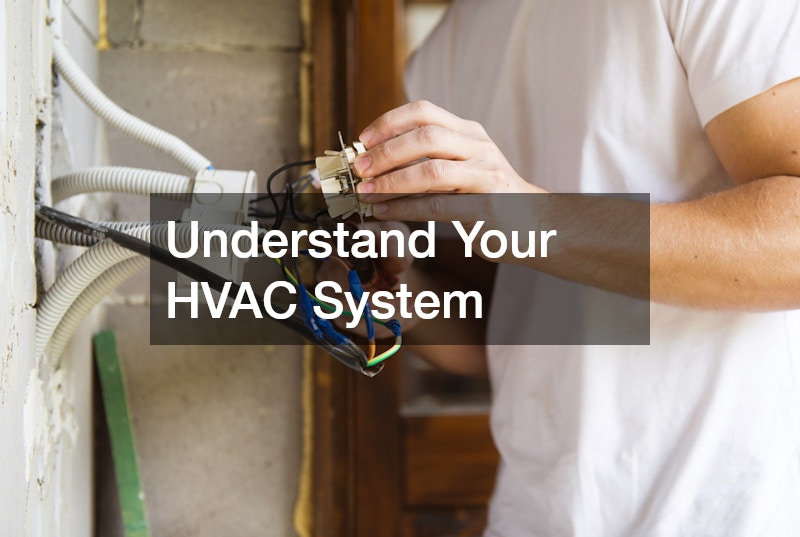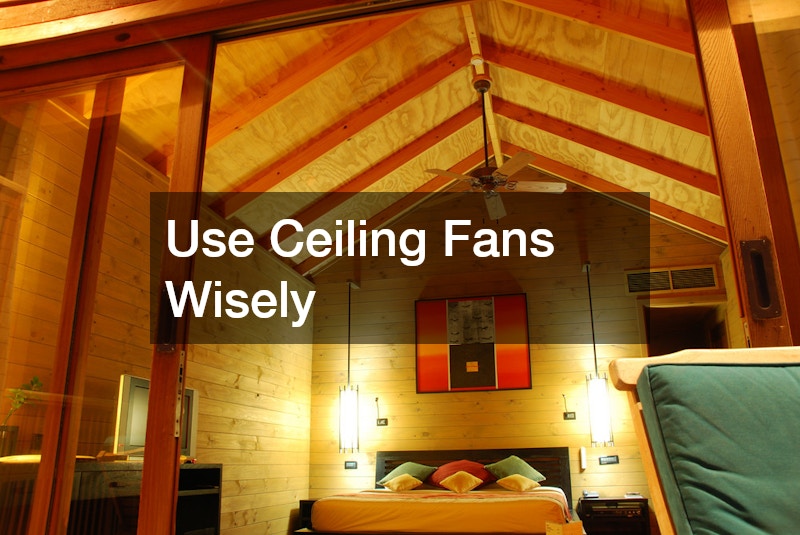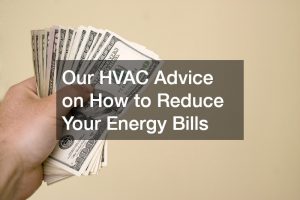When it comes to keeping your home comfortable and energy-efficient, your HVAC system plays a crucial role. Proper maintenance and smart usage habits can make a significant difference in your energy bills. In this article, we will provide you with 10 valuable HVAC tips to help you enhance the efficiency of your heating, ventilation, and air conditioning system.
Understand Your HVAC System

Before you can effectively optimize your HVAC system, it’s essential to understand how it works. AC companies can provide valuable insights into the components of your system and how they function. By familiarizing yourself with your HVAC setup, you can more easily identify potential issues and make informed decisions about maintenance and repairs.
By gaining knowledge about your HVAC system, you can also follow HVAC advice from experts and implement best practices for optimal performance. Understanding how your heating and cooling system operates will enable you to troubleshoot minor problems and avoid costly repairs down the line.
Being aware of the intricacies of your HVAC system can also help you communicate more effectively with HVAC technicians when seeking professional assistance. Whether you’re scheduling maintenance or upgrading your equipment, understanding the basics of your system will empower you to make well-informed decisions.
Schedule Regular Maintenance
One of the most effective ways to keep your HVAC system running smoothly is to schedule regular maintenance with a reputable air conditioning repair company. HVAC advice typically emphasizes the importance of proactive maintenance to prevent breakdowns and ensure efficient operation. By having your system inspected and serviced regularly, you can address minor issues before they escalate into major problems.
During routine maintenance visits, HVAC technicians will clean, inspect, and tune up your heating and cooling equipment to ensure optimal performance. This proactive approach can extend the lifespan of your system, improve energy efficiency, and enhance indoor air quality. By investing in regular maintenance, you can enjoy reliable comfort and lower energy bills throughout the year.
Professional HVAC maintenance can also help you identify opportunities for improvement and upgrade your system to maximize efficiency. Whether it’s replacing worn-out components or adjusting settings for better performance, regular servicing can unlock the full potential of your HVAC system.
Invest in a Programmable Thermostat
When it comes to reducing energy consumption and saving money on heating and cooling costs, a programmable thermostat is a valuable asset. HVAC repairs often involve inefficient thermostat settings that waste energy and compromise comfort. HVAC advice frequently recommends upgrading to a programmable thermostat to optimize your home’s temperature control.
With a programmable thermostat, you can set specific temperature levels for different times of the day or week, allowing you to adjust your HVAC system’s operation according to your schedule. By programming your thermostat to reduce heating or cooling when you’re away or asleep, you can avoid unnecessary energy use and lower your utility bills. Investing in a programmable thermostat is a simple yet effective way to enhance energy efficiency and comfort in your home.
In addition to improving energy efficiency, a programmable thermostat can also provide convenience and flexibility in managing your home’s climate. By automating temperature adjustments based on your preferences, you can enjoy a comfortable indoor environment without constantly adjusting the settings manually.
Seal and Insulate Ductwork

One common cause of energy loss in HVAC systems is leaky or poorly insulated ductwork. HVAC services often include duct inspection and sealing to prevent air leaks and improve efficiency. HVAC advice stresses the importance of sealing and insulating ductwork to ensure that conditioned air reaches its intended destination without escaping through gaps or cracks.
Leaky ductwork can result in energy waste, uneven heating and cooling, and decreased indoor air quality. By sealing duct seams with appropriate materials and insulating ducts in unconditioned spaces, you can minimize energy losses and improve the overall performance of your HVAC system. Professional duct sealing and insulation services can help you maximize comfort and efficiency in your home.
In addition to addressing ductwork issues, proper insulation in your home’s walls, floors, and attic can further enhance energy efficiency. By keeping heat in during the winter and out during the summer, insulation plays a vital role in reducing your heating and cooling costs and maintaining a consistent indoor temperature.
Upgrade to Energy-Efficient Equipment
When it’s time to replace your HVAC equipment, consider upgrading to energy-efficient models recommended by a local heating and cooling company. HVAC advice often highlights the benefits of high-efficiency furnaces, air conditioners, and heat pumps in reducing energy consumption and operating costs. Upgrading to energy-efficient equipment can significantly lower your carbon footprint and enhance your home’s energy efficiency.
Energy-efficient HVAC systems utilize advanced technologies and features designed to maximize performance while minimizing energy usage. By investing in equipment with high Seasonal Energy Efficiency Ratio (SEER) ratings for cooling and Annual Fuel Utilization Efficiency (AFUE) ratings for heating, you can enjoy increased comfort and lower energy bills. Furthermore, many energy-efficient HVAC systems are eligible for rebates and incentives, making them a cost-effective choice for environmentally conscious homeowners.
In addition to upgrading your heating and cooling equipment, consider installing programmable thermostats, smart controls, and other energy-saving devices to further enhance the efficiency of your HVAC system. By taking a comprehensive approach to energy conservation, you can create a more sustainable and comfortable living environment for your family.
Optimize Your Home’s Insulation
Proper insulation is essential for maintaining consistent indoor temperatures and reducing energy consumption. Local plumbers can help you assess the insulation levels in your home and recommend improvements to enhance energy efficiency. HVAC advice often emphasizes the importance of adequate insulation in walls, floors, and ceilings to prevent heat transfer and improve comfort.
Insufficient insulation can lead to temperature fluctuations, energy waste, and increased HVAC runtime to maintain desired comfort levels. By upgrading your home’s insulation with high-quality materials and professional installation, you can create a more energy-efficient and environmentally friendly living space. Proper insulation also helps reduce noise transmission and improve indoor air quality by sealing out pollutants and allergens.
In addition to adding insulation, consider sealing air leaks around windows, doors, and other openings to prevent drafts and outside air infiltration. By combining insulation with air sealing measures, you can further enhance energy efficiency and create a more comfortable and sustainable home environment.
Use Ceiling Fans Wisely

Ceiling fans can complement your HVAC system by improving air circulation and comfort in your home. Local plumbing contractors can install ceiling fans in key living areas to enhance airflow and reduce the workload on your heating and cooling equipment. HVAC advice often recommends using ceiling fans strategically to distribute air evenly and maintain consistent temperatures throughout your home.
During the summer, set your ceiling fans to rotate counterclockwise at a higher speed to create a cooling breeze that makes it feel more comfortable without lowering the thermostat. In the winter, reverse the fan direction to clockwise at a lower speed to gently push warm air down from the ceiling and circulate it throughout the room. By using ceiling fans wisely, you can improve comfort, reduce energy consumption, and enhance overall efficiency in your home.
Modern ceiling fans are energy-efficient and available in a variety of styles to complement your home’s decor. By choosing models with built-in LED lights or remote controls, you can further enhance convenience and functionality while saving energy. Ceiling fans are a versatile and cost-effective solution for improving indoor air circulation and optimizing your HVAC system’s performance year-round.
Mind Your Windows and Doors
Windows and doors are significant sources of heat gain and loss in your home, impacting your HVAC system’s efficiency and comfort levels. Plumbing services can help you address window and door issues that contribute to energy waste and indoor air leaks. HVAC advice frequently emphasizes the importance of proper sealing, insulation, and shading to optimize energy efficiency and thermal comfort.
Seal gaps and cracks around windows and doors with weatherstripping or caulking to prevent drafts and heat transfer. Consider upgrading to energy-efficient windows with double or triple glazing and low-emissivity coatings to reduce heat gain in the summer and heat loss in the winter. By enhancing the insulation and thermal performance of your windows and doors, you can create a more energy-efficient and comfortable living environment.
In addition to sealing and insulating, use window treatments like curtains, blinds, and shades to control sunlight and heat penetration throughout the day. By adjusting window coverings to block direct sunlight during hot periods and allow natural light in during cooler times, you can reduce your reliance on artificial lighting and HVAC systems. Mindful management of windows and doors can significantly improve energy efficiency and enhance your home’s overall sustainability.
Consider Zoning Systems
Zoning systems offer a personalized approach to heating and cooling by dividing your home into separate areas with independent temperature controls. Plumbing companies can install zoning systems that allow you to customize comfort levels in different rooms based on your preferences and usage patterns. HVAC advice often recommends zoning systems for enhancing energy efficiency and comfort in multi-story or large homes.
With zoning systems, you can regulate temperatures in specific zones according to occupancy, time of day, or individual preferences. By heating or cooling only the areas that are in use, you can avoid wasting energy on unoccupied spaces and optimize comfort where it’s needed most. Zoning systems can also help address temperature variations between floors or rooms with different sun exposure, ventilation, or insulation levels.
By incorporating zoning systems into your HVAC setup, you can enjoy greater flexibility and control over your home’s climate while reducing energy consumption and operating costs. Zoned heating and cooling enable you to tailor comfort settings to each area of your home, providing personalized temperature control and maximizing energy efficiency. Consider zoning systems as a smart investment in energy conservation and home comfort.
Be Mindful of Your Usage Habits
Your usage habits can have a significant impact on your HVAC system’s performance and energy efficiency. Residential plumbers recommend being mindful of how you use heating, cooling, and ventilation systems to avoid unnecessary energy consumption. HVAC advice often suggests simple yet effective practices for optimizing comfort while minimizing energy waste.
Set your thermostat to moderate temperatures that are comfortable for occupants and energy-efficient for your HVAC system. Avoid extreme temperature settings that force your heating or cooling equipment to work harder and consume more energy. Use natural ventilation, ceiling fans, or zone-specific controls to maintain comfort levels without relying solely on central HVAC systems.
Be conscious of air leaks, wasted energy, and inefficient practices that contribute to high utility bills and environmental impact. Turn off lights, appliances, and electronics when not in use to reduce heat gain and strain on your cooling system. Foster energy-saving behaviors among family members and encourage responsible energy usage to promote a sustainable and cost-effective home environment.
Monitor Your Energy Consumption

Monitoring your energy consumption is key to understanding how your HVAC system impacts your utility bills and overall carbon footprint. HVAC advice often stresses the importance of tracking energy usage, identifying trends, and making adjustments to improve efficiency. By monitoring your energy consumption, you can pinpoint areas of wastage and implement strategies to reduce your environmental impact.
Use smart thermostats, home energy monitoring systems, or utility tracking tools to monitor your heating and cooling usage in real-time. Analyze your energy consumption patterns and look for opportunities to reduce peak demand periods or adjust temperature settings for optimal efficiency. By staying informed about your energy usage, you can make informed decisions about conservation measures and equipment upgrades.
Consider scheduling energy audits or assessments with HVAC professionals to evaluate your home’s energy performance and identify opportunities for improvement. By partnering with local heating and cooling companies, you can receive personalized recommendations for enhancing energy efficiency, reducing energy costs, and minimizing your carbon footprint. Regular monitoring of your energy consumption can lead to long-term savings, increased comfort, and environmental responsibility.
Enhancing the energy efficiency of your HVAC system is a worthwhile investment that can lead to lower utility bills, improved comfort, and environmental sustainability. By following these 10 HVAC tips and incorporating expert advice from AC companies, air conditioning repair specialists, HVAC services providers, and local contractors, you can optimize your home’s heating, ventilation, and air conditioning systems for peak performance. Whether it’s scheduling regular maintenance, upgrading to energy-efficient equipment, or adopting mindful usage habits, every step you take toward energy efficiency brings you closer to a more comfortable and eco-friendly living environment.



